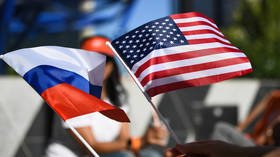Ukraine ‘invasion’, Belarus & strategic stability: What to expect from Putin-Biden summit

The presidents of the US and Russia are set to have another one-on-one "summit," which is expected to focus on Ukraine and the West’s claims that Moscow is planning to invade its neighbor.
Vladimir Putin and Joe Biden will have a bilateral meeting on Tuesday via a video link. The American leader plans to “underscore US concerns with Russian military activities on the border with Ukraine and reaffirm the United States’ support for the sovereignty and territorial integrity of Ukraine,” White House spokesperson Jen Psaki has indicated.
The supposed threat of Russian aggression against Ukraine has been trumpeted in the West since mid-November. Over the weeks, vague claims of a Russian military buildup morphed into full-blown explanations of how the invasion would unfold, complete with maps showing directions of offensive operations, based on US intelligence reportedly shared with NATO members.
German newspaper Bild has made a map of a possible Russian invasion of Ukraine, according to estimates of sources from NATO and Ukrainian intelligence. It includes an attack on Kiev. The Russian Foreign Ministry called the article nonsense and "propaganda mixed with ideology." pic.twitter.com/wM6YXyGlMv
— Dr. Clayton Forrester (@DrClaytonForre1) December 5, 2021
New Afghanistan for Russia
The war scenario, hypothetical as it may be, has understandably caught the imagination of Western media. Some in the US even appear to secretly wish for it to come true and become a disaster for Moscow.
“Ukraine can become the next Afghanistan for Russia if it chooses to move further,” Chris Murphy, a member of the Senate Committee on Foreign Relations, told CNN, adding that the US Congress should be ready to support Ukraine with arms and other support.
He was referring to the Soviet Union’s 1980s Afghan deployment and the harm that the US managed to inflict on Moscow by arming local Islamist militias.
Alluring as it may be for the American establishment, the analogy between Ukraine and Afghanistan is hardly justified, counters Ivan Timofeev, a program director at the Russian International Affairs Council, a diplomatic think-tank.
“They are incommensurable in many regards – political, geographical, historical – they are too different… That is on top of the fact that we don’t consider war as the basic scenario,” he told RT.
Putin ‘wins by talking to Biden’
Officials in Kiev state that a Russian attack is bound to happen sometime after January 20. But even the fiercest critics of the Russian government are skeptical that military action will actually take place. Barack Obama’s ambassador to Russia, Professor Michael McFaul, believes that getting Biden to agree to a one-on-one was a major goal for Russia.
“When Putin staged an earlier military buildup on Ukraine’s border in the spring, Biden responded by requesting a high-profile meeting in Geneva, with all the pageantry of Cold War superpower summits. Putin loved it,” he opined.
The June Biden-Putin meeting in Switzerland likewise happened after Western and Ukrainian media spent months hyping up a looming “Russian aggression” that never materialized. Both then and now, Russia outlined that all of its troop movements were purely defensive.
Absent a chance to deny Putin that “win,” the ex-diplomat, turned 'Russiagate' conspiracy theorist, called on Biden to “embrace more coercive diplomacy” towards Russia. The US leader should come to the meeting publicly armed with a Western commitment to impose more sanctions against Moscow and help Ukraine with weapons, money, and assistance in democratic state-building, McFaul advised.
‘Impression of inevitable conflict’
The situation is perceived quite differently in Moscow. Russian officials say media “hysteria” is serving the agenda of Russia-hawks, who oppose even the slightest hint of detente between the West and Moscow.
“The goal [of the leaks] was to create a self-sustaining impression of the inevitability of a conflict,” according to Senator Konstantin Kosachev, who for years chaired the Foreign Affairs Committee in the upper chamber of the Russian parliament. He explained that an escalation of violence could only happen if Ukraine initiated it.
Both McFaul and Kosachev predict that the US and its NATO partners won’t risk their own forces for Kiev. Last week, Ukraine’s defense minister called on America, Britain, and Canada to deploy their troops on Ukraine’s eastern flank.
Defusing Ukraine
McFaul’s reduction of Russia’s foreign policy to a high-school drama over who gets to sit with the cool kids is not grounded in reality, said Pavel Sharikov, a senior researcher at the Institute for USA and Canada Studies of Russian Academy of Sciences, because Moscow is simply too influential to be ignored.
“The US-Russian agenda is quite big and serious. In addition to Ukraine, there are Belarus, Georgia, strategic stability, cybersecurity… the global great power rivalry involving China,” he insisted to RT.
That said, the Ukraine situation has been pumped up quite a lot, including by statements coming from Moscow itself, he added. Regardless of how it came to be, “this kind of tension can only be deescalated through direct talks between Putin and Biden,” Sharikov concluded.














